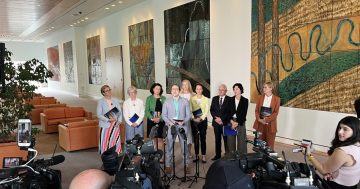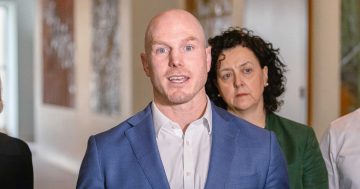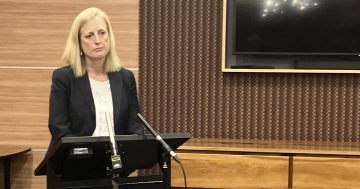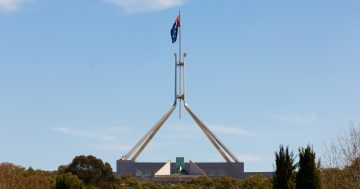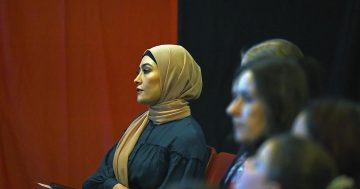
Independent ACT Senator David Pocock is pushing for serious electoral reform. Photo: Michelle Kroll.
ACT Senator David Pocock has joined with Crossbenchers from both houses of Federal Parliament in a strong call for urgent electoral reform.
Stating they want changes implemented before the next Federal Election, due in May next year, the group of 13 is supporting legislation that would ban political donations greater than $1.5 million and require real-time disclosure of any donation over $1000.
Their bill, being introduced in the House of Representatives and the Senate, would ban donations from the gambling and fossil fuel industries as well as government contractors, and come down hard on deliberately misleading campaign advertising.
The independent and Greens MPs say the bill proposes to improve transparency, protect voters from outright lies, reduce financial influence, level the playing field and limit excessive donations.
It limits governments using taxpayer funds to advertise before elections and “cleans up data harvesting” in the postal voting process.
The legislation’s proposal for a major donor cap would prevent any individual from donating more than 2 per cent of the public funding paid for the last election.
The bill puts the hard word on Labor, which has promised electoral reform (including lowering the donation disclosure threshold to $1000 and disclosing donations within a week) but hasn’t yet produced any legislation.
The government believes it would have to negotiate with the Opposition to get anything passed on the issue.
The Coalition is not prepared to back any of the measures put forward by the Crossbench.
Senator Pocock, who along with Greens Senator Larissa Waters has carriage of the bill in the Senate, said the Crossbench was taking this approach to ensure the government didn’t buckle into pressure to water down its own proposed electoral reforms.
“Our bill, being introduced concurrently in both houses with the support of our Crossbench colleagues, gives this parliament an opportunity to enact serious and long overdue electoral reform before the next federal election,” he said.
“We live in a well functioning democracy, but we have seen this increasingly under threat and must act now to improve our democratic processes.
“This bill puts forward sensible, best practice changes that have wide ranging support and will increase transparency and accountability of politicians and political parties during elections, ultimately strengthening our democracy.”
Senator Waters said the group of Crossbenchers was not prepared to wait any longer for the government to act.
“We’ve been waiting 18 months for the government to come good on its promise to reform electoral laws to reduce the influence of big money on political decision-making,” she said.
“The Crossbench has used that time to draft our own joint bill, which has the numbers to pass both houses of parliament if the government got on board.
“People are sick of democracy being for sale, and big donors calling the shots. This bill would stop the huge sums of money from dirty industries with a track record of trying to buy favourable policy outcomes.
“History shows that electoral reform proposed by the major parties has in-built loopholes to ensure their own big money is retained, while hampering the chances of any challengers.
“Any reform which limits donations to those who challenge Liberal and Labor, while protecting the establishment parties’ sources of income, will be seen for what it is – a complete stitch up, undermining our democracy, and the public’s expectation of fair play.”
Independent Member for Curtin Kate Chaney, who is leading the legislative push in the House of Representatives, said the bill demonstrated to the government that it didn’t need to wait for Opposition support to implement reform.
“There’s a majority in both houses that wants to see these reforms before the next election,” she said.
“Voters deserve to know who is funding their candidates and be protected from outright lies in political advertising.
“They also deserve to know they have a competitive choice of candidates.
“We know that the Liberal Party doesn’t want reform on transparency, reducing financial influence or levelling the playing field.
“It seems likely they will only be willing to do a deal with the government if that deal embeds the two-party system and makes it harder for new candidates to get elected.
“This bill provides the government the opportunity to show it has listened and is interested in reforms that build trust, not changes that embed the two-party system.”
When asked about electoral reform during Question Time on Tuesday (19 March), Anthony Albanese said he had held constructive discussions about electoral reform with many of the Crossbench MPs.
But he also noted that independents also received campaign donations.
The Prime Minister recently confirmed that the government was looking at how to force advertisements during election campaigns to be more truthful, but the issue was becoming more difficult due to the activities of third-party players.
“These things are not easy to achieve. We’re examining, and there’s been various committees looking at how you might achieve that,” he said.
“But it is difficult because some people will argue what the facts are during a political campaign.”













